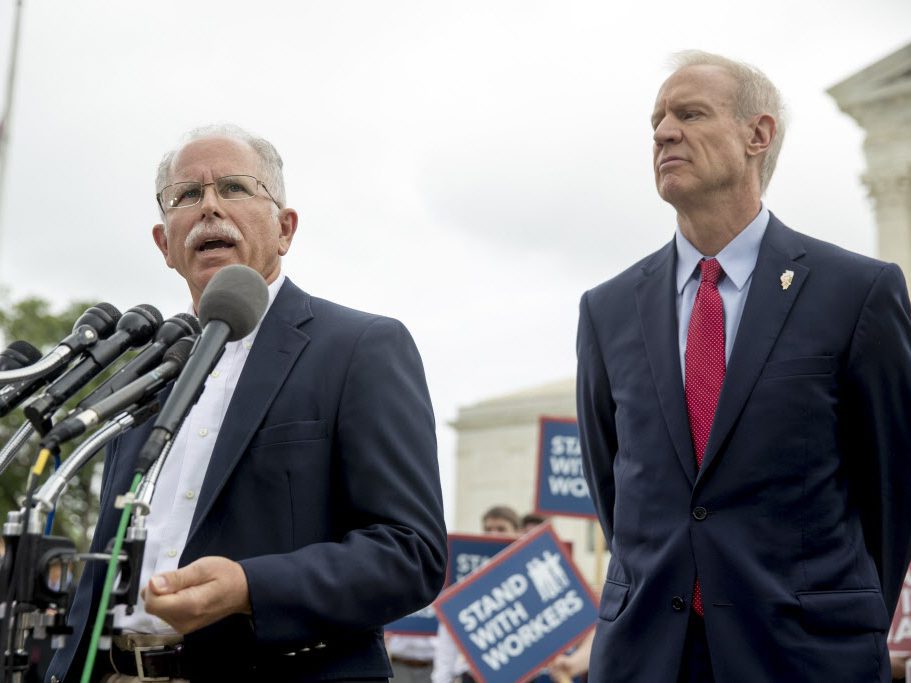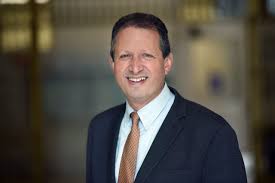WASHINGTON—The Supreme Court won’t decide whether to take the case dubbed “Janus II” until at least this fall.

Mark Janus, plaintiff in the Court’s 2018 Janus v. AFSCME Council 31 decision that ruled public-sector workers could not be required to pay “fair-share fees” to the union representing them, filed a follow-up suit demanding that Council 31 refund him the about $2,800 he’d paid in the five years before the decision. The federal Court of Appeals for the 7th Circuit upheld a lower court’s dismissal of his claim last November.
The Supreme Court had scheduled discussions on whether to hear Janus’s appeal for June 25, but postponed them. Four justices would have to agree that the Court should take the case, one of more than 50 in which public-sector employees backed by anti-union litigators have sought to force unions to refund fees.
“Federal courts across the country continue to reject these attempts by corporate interests to manipulate the judiciary against working people and trample on their rights and freedom to join together in a union,” Judith Rivlin, general counsel for the American Federation of State, County, and Municipal Employees, said in a statement. “Working people have won every single case thrown at them by these special interest groups, and if judges continue to weigh these cases on the facts and merits, the corporate interests behind them will continue to fail in their efforts to further rig the system in their favor.”
The 2018 Janus decision reversed the court’s 1977 Abood ruling that workers could be required to pay fees to cover the costs of union representation, but not to contribute to union political activity. It upheld Janus’s claim that having to pay AFSCME for representing him as an Illinois state employee violated his free-speech rights, on the grounds that all public-sector union activity is inherently political.
Janus’s follow-up suit, backed by the National Right to Work Legal Defense Foundation and the Chicago-based Liberty Justice Center, argues that because the Court held that he could not be compelled to subsidize the union’s speech, AFSCME violated his civil rights under color of law by collecting fees while they were considered legal.
“The Supreme Court agreed that the union taking money from nonmembers was wrong, but the union still has the money it illegally garnished from my paycheck,” Janus said in a statement in March. He is also arguing that AFSCME should have known the fees might be held unconstitutional.
The two lower courts rejected that argument, holding that AFSCME had followed the law and collected the fees in good faith. “The statute on which defendant relied had been considered constitutional for 41 years,” a federal district court in Chicago said when it dismissed Janus’s case in March 2019.
“The Rule of Law requires that parties abide by, and be able to rely on, what the law is, rather than what the readers of tea leaves predict that it might be in the future,” the 7th Circuit appeals court said in upholding that dismissal. “Until Janus said otherwise, AFSCME had a legal right to receive and spend fair-share fees collected from nonmembers as long as it complied with state law and the Abood line of cases.”
Moreover, the court added, “though Mr. Janus contends that he did not want any of the benefits of AFSCME’s collective bargaining and other representative activities over the years, he received them…. There was no unjust ‘windfall’ to the union, as Mr. Janus alleges, but rather an exchange of money for services.”
The source of the “windfall” quote, however, indicates there’s a good chance four Supreme Court justices would want to take Janus’s appeal. In the majority opinion in the 2018 Janus decision, Justice Samuel Alito wrote that unions had received a “considerable windfall” from being able to collect representation fees from nonmembers over the previous 41 years. “It is hard to estimate how many billions of dollars have been taken from nonmembers and transferred to public-sector unions in violation of the First Amendment,” he added.
Anti-union litigators began filing fee-refund lawsuits even before the Janus case was decided. In their brief asking the Supreme Court to hear Janus’s appeal, the Liberty Justice Center and the National Right to Work Legal Defense Foundation said there have been 37 class-action suits and numerous individual suits.
However, many have been rejected by both federal district and appeals courts, on the grounds that the unions collected the fees in good faith. On April 15, the 2nd Circuit upheld a lower court’s dismissal of two Connecticut state employees’ bid for refunds from CSEA SEIU Local 2001.
Four of the nation’s 12 regional appeals courts—the 2nd, 6th, 7th, and 9th Circuits—have made similar rulings. Those four circuits cover New York, Connecticut, most of the Midwest, and nine Far West states, including the jurisdictions where 28 of the 37 class-action suits were filed.
A Liberty Justice Center spokesperson told LaborPress that the organization now has seven fee-refund suits pending in federal courts in Illinois, Maryland, Minnesota, New York, and Pennsylvania. In Pennsylvania, LJC and the NRTW legal foundation are suing AFSCME Council 13 and SEIU Local 668. In Minnesota, they sued AFSCME Council 5 and the Minnesota Association of Professional Employees on May 11, seeking to have AFSCME pay up to $13 million to 8,000 state and local workers.
A related issue is litigation involving when a worker can quit a union—can unions have workers sign up permanently, or for a limited period such as one year or the duration of a contract? On May 4, two Chicago teachers represented by the NRTW legal foundation filed suit against the Chicago Teachers Union and the city Board of Education claiming the right to quit any time, instead of just during the “escape period” each August authorized in the union’s contract. The two had tried to resign from the CTU last October, when they crossed picket lines during its two-week strike.
In Texas, state Attorney General Ken Paxton issued an opinion June 1 stating that a “one-time, perpetual authorization is inconsistent with the Court’s conclusion in Janus that consent must be knowingly and freely given.” He suggested that having public employees affirm their choice to pay union dues or fees each year would be constitutional under the decision.
Texas AFL-CIO President Rick Levy called that opinion “a non-binding polemic.”
“In the absence of any relevant case law or court directive, Paxton simply makes up a standard in a transparent effort to cater to the ideologues who sponsor him,” Levy said in a statement. “The opinion would strip the freedom of public workers to make their own decisions about how to spend their own paychecks without state interference.”



